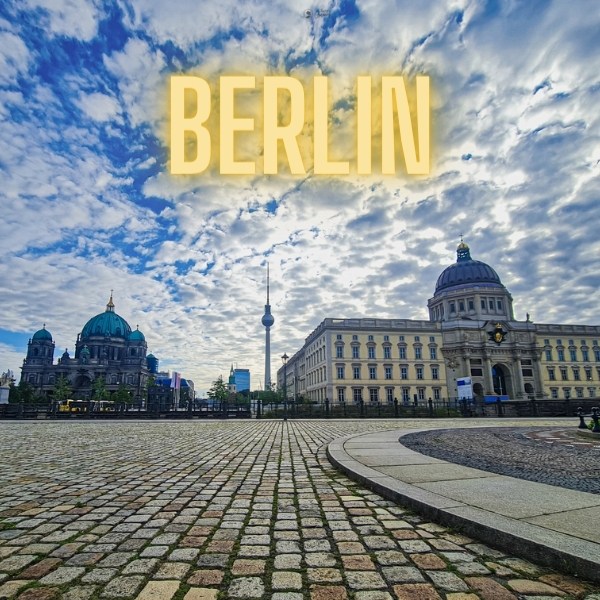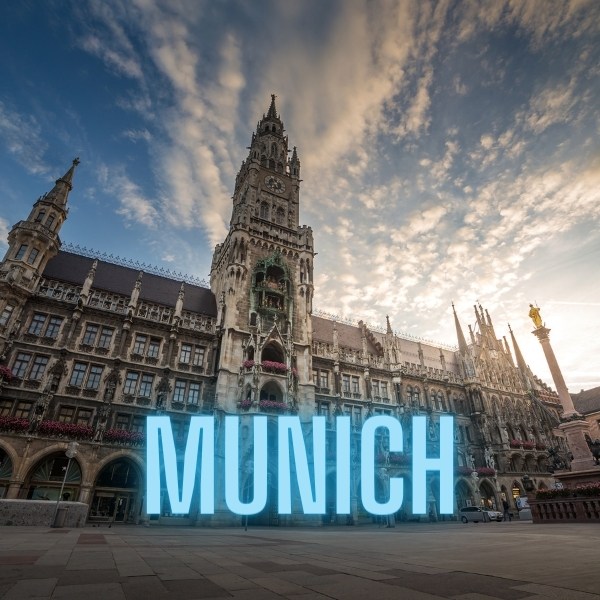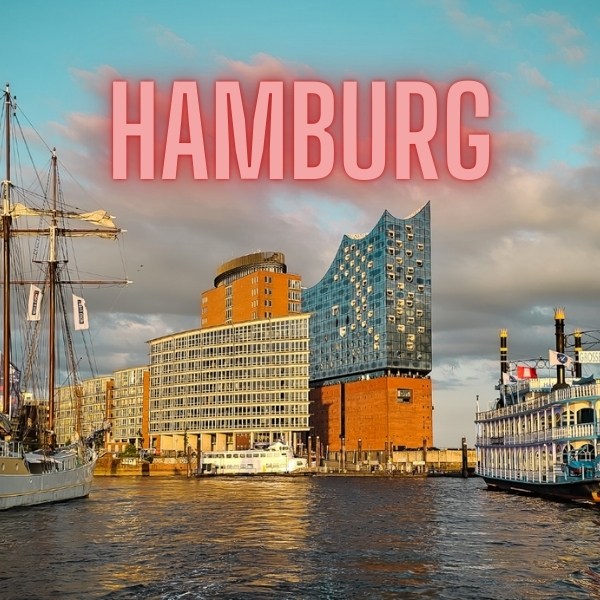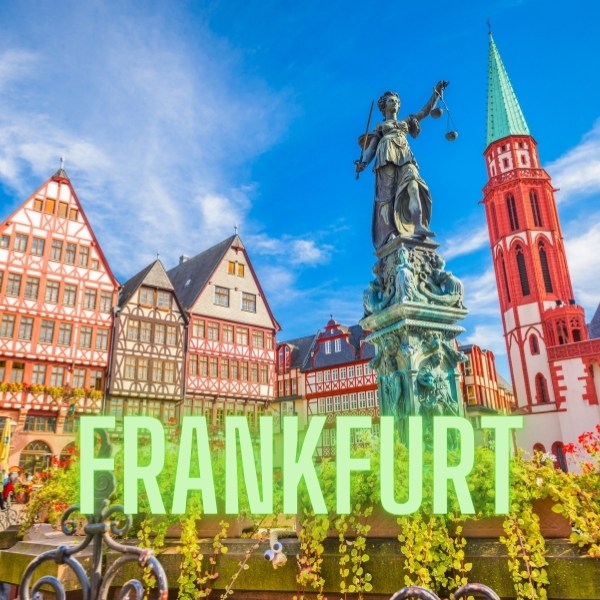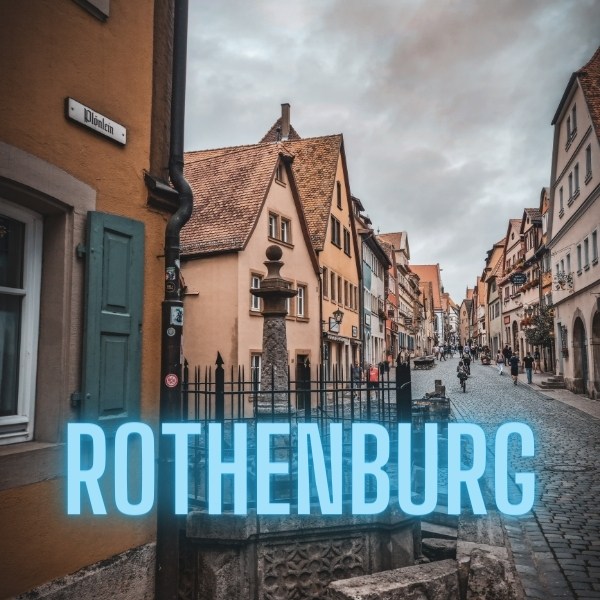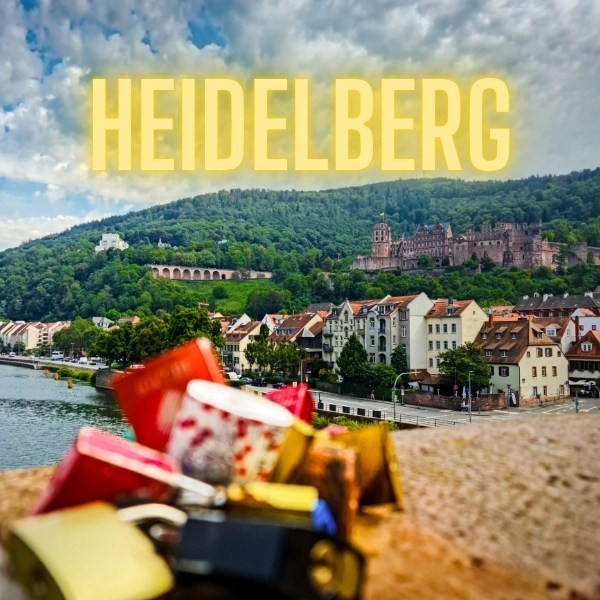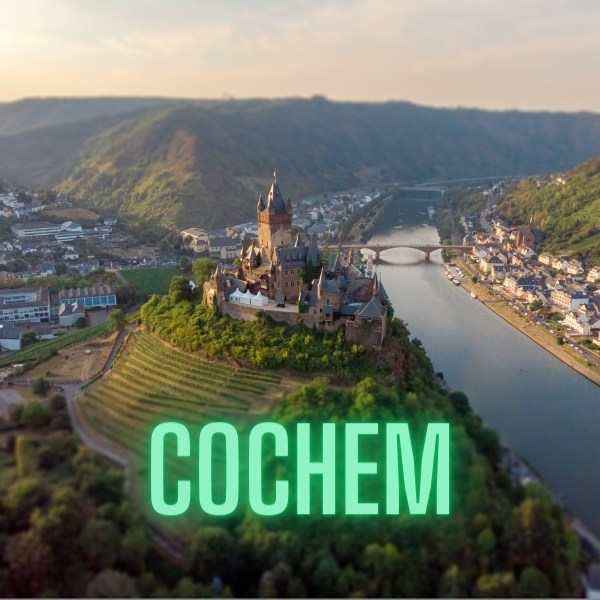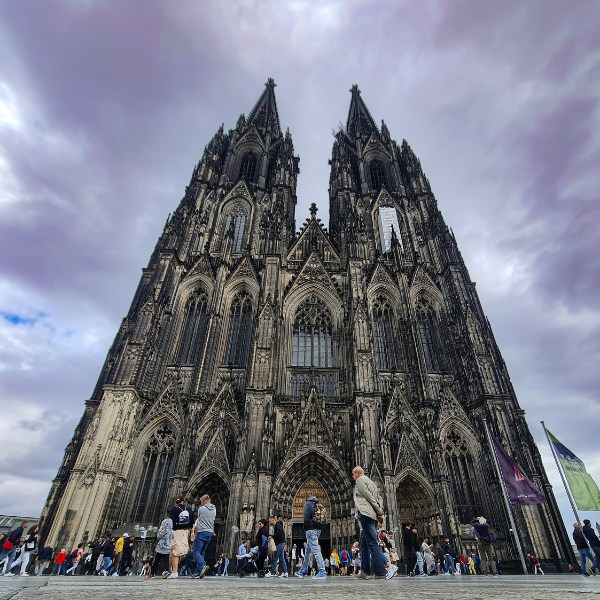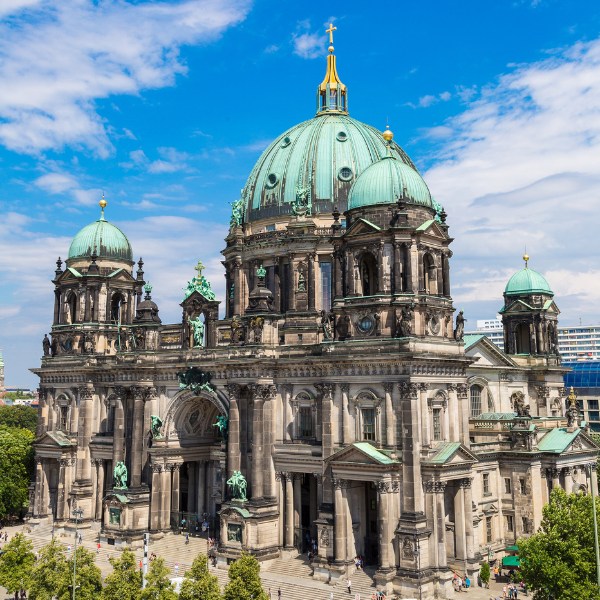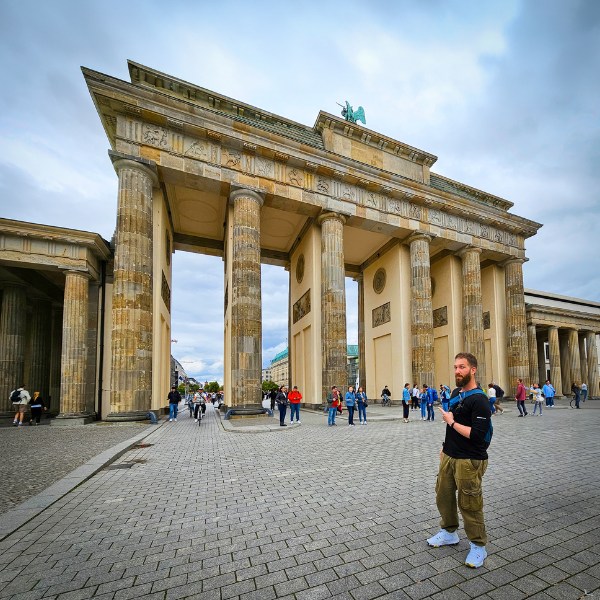Our thank you sale is on now - save 10% off any item, or 15% off two or more!
- Home
- Germany Travel Tips
Germany Travel Tips Guide: Key things to know before you go.
By: Eran Fulson / Traveler, writer, and curious observer of all things German.
Whether you're planning a trip or you're there right now, this Germany Travel Tips guide is full of information and ideas to help your visit go as smoothly as possible.
Germany is filled with a rich history, stunning architecture, expansive landscapes, wonderful comfort food, and, of course, Bier.
Here are some of the things I wish I knew before my first trip...
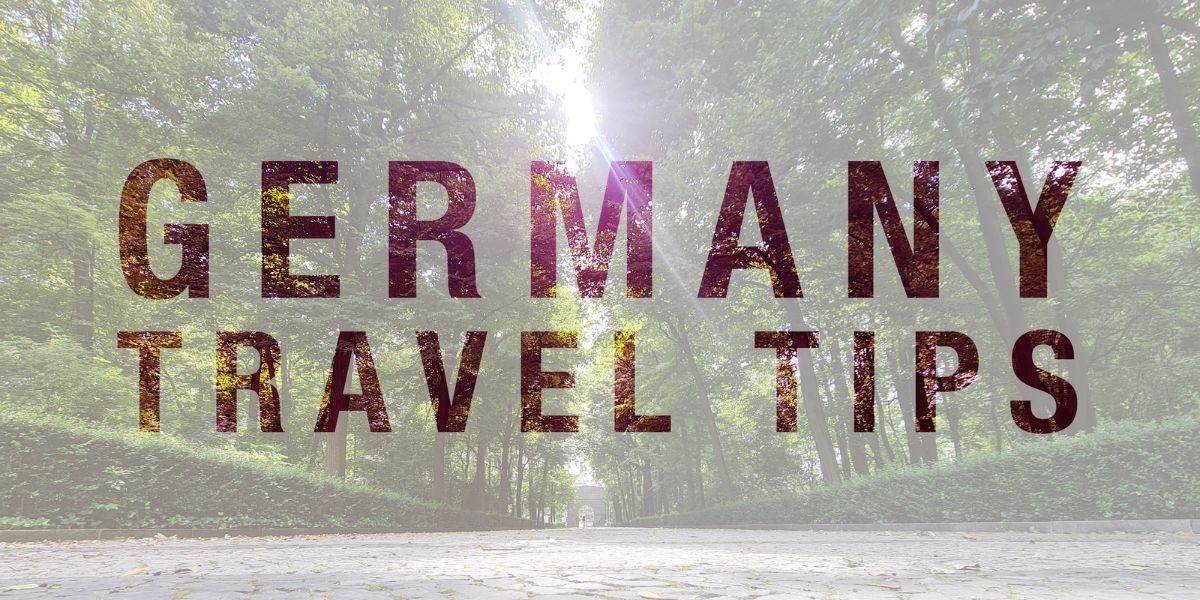 On a path to the Soviet War Memorial in Tiergarten, Berlin.
On a path to the Soviet War Memorial in Tiergarten, Berlin.On this page:
Germany Travel Tips - At a Glance
Currency: Euro
Electrical Plug Type: Type F (Europlug)
Emergency Numbers: Fire & Ambulance 112, Police 110
National Railway: Deutsche Bahn
Travel Checklist PDF: VIP Club (subscribe to our newsletter for free download)
Best Time to Visit Germany
The number one topic for small talk (something for which Germans are not known) is, of course, the weather.
Some of this may seem obvious, but since we cater to both hemispheres, here's a general overview of the weather in Germany. Bear in mind that regional weather will vary due to altitude differences and proximity to bodies of water. As a fairly broad rule of thumb, the following should suffice...
quick tip
The weather can change in an instant. It is not uncommon to experience a switch from sun to rain multiple times in a day. It’s always best to pack a small travel umbrella for an unexpected shower.
If you’re planning to visit Germany during the winter, be prepared for cold temperatures and coinciding snowy or icy conditions.
From the Alps in the south up to the North Sea and the Baltic, pack warm and waterproof clothing. Layering, versus one massive coat, is highly recommended.
The summer months bring plenty of heat. July and August can be particularly muggy, especially in the southern regions. A small rechargeable fan has been a mainstay in our luggage for a while now.
And while it goes without saying, don’t forget the appropriate footwear depending on your activity.
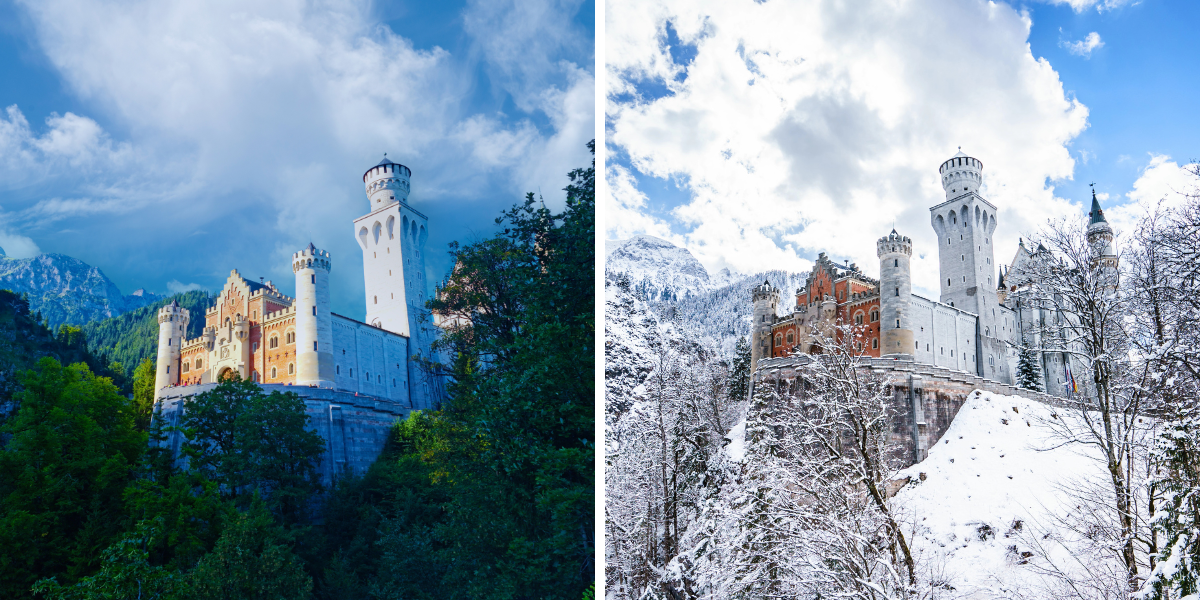 I can't decide which one either...
I can't decide which one either...The tourist season typically runs from May to September. If you’re looking to beat the crowds while still catching some nice weather, late September is going to be your best bet.
As the summer breaks into autumn, the warmer days are happily relieved by the cooler nights. And before you know it, it's Oktoberfest, and then Christmas.
Germany's shoulder season (the period between peak and off seasons) typically runs from April–May and September–October.
Not only accounting for the temperature, but your wallet will also thank you for going in these periods. Flights, hotels, and venues all tend to inflate their prices during Germany’s peak tourist season.
Public Transportation in Germany
As far as getting from Point A to Point B is concerned, Germany’s public transportation legacy is known around the world.
I will caveat this by conceding that, while it isn’t faultless, it’s certainly better than most. That said, the infrastructure linking cities and inter-city travel makes getting around the country a fairly painless experience.
The best way to travel long distances is undoubtedly by train.
For multiple train trips via Deutsche Bahn, consider an Eurail Pass. This allows travel on most trains in Germany and other European countries for a set period.
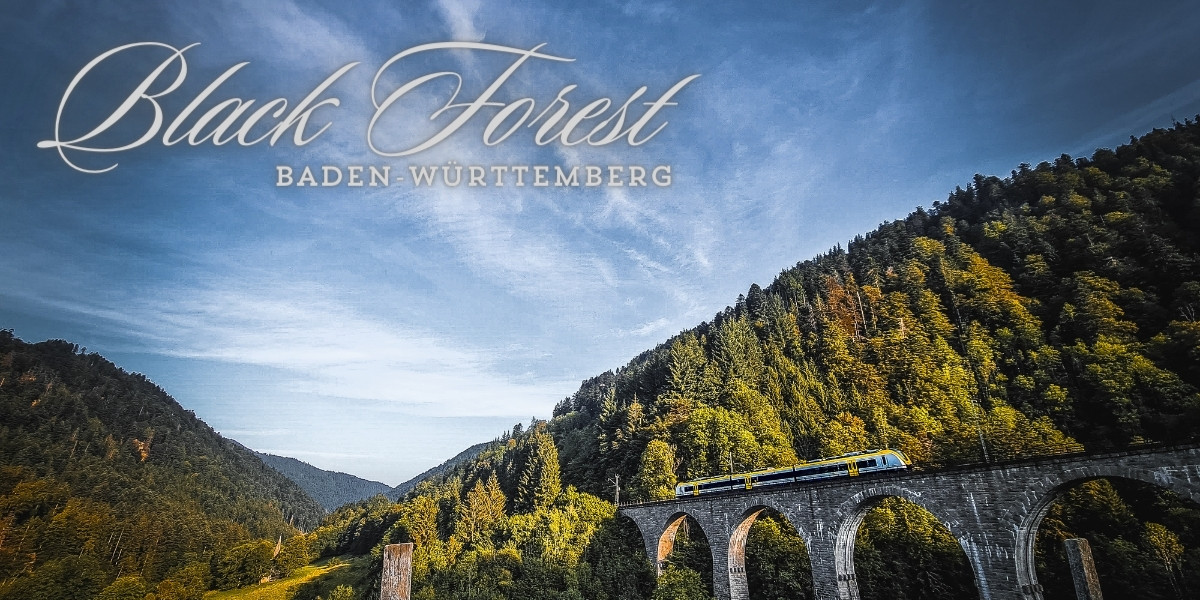 Imagine that view as you roll along.
Imagine that view as you roll along.For shorter distances, Germany also has an extensive network of buses and regional trains that are affordable and convenient.
In the cities, public transportation is also a great option, with most major German cities having efficient subway, tram, and bus systems.
Another thing to consider is checking what the local travel card offers. Most larger cities have one, and they typically offer decent savings and discounts on transport, dining, and tourist attractions.
If you plan on using local public transportation frequently during your trip, consider buying a German Rail Pass. This allows unlimited travel on trains, appropriate buses, and trams for a set period of time. Just be sure to validate your ticket before boarding, as failing to do so can result in a hefty fine.
quick tip
Be sure to validate your ticket before boarding, as failing to do so can result in a fine and public embarrassment.
I’d be remiss not to mention the autobahn. If you’re coming from a country that has fairly conservative views on speed limits, this will be as good of a time as any to rent a car and put your foot down.
However, some points to note are: Overtaking vehicles on the right is forbidden, unless you’re in a traffic jam. And roughly 30% of the autobahn has speed limits, so you’ll need to keep an eye out.
It's also good to know that if you’re renting a car in Germany, stick-shift is standard practice in the EU. Be certain it’s automatic if that’s what you’re after.
Accommodation in Germany
When it comes to accommodation, Germany offers a wide range of options to suit every budget in most corners of the country. Cities of all sizes offer the usual hotels, hostels, and vacation rentals to choose from.
A more authentically German experience will be found in a traditional guesthouse or a bed and breakfast. In rural areas, farmsteads and the aforementioned vacation rentals offer an even more unique and culturally immersive experience.
For a truly unique experience, consider staying in a castle hotel. Lydia has covered more than a few options around the country that will make you feel like nobility - Castle Hotels in Germany.
Rustically speaking, if you want to get up close and personal with nature, there's a bevy of national parks and campgrounds to choose from. I've already written a post about all you need to know here - Camping in Germany.
When booking accommodations in Germany, note that many hotels and guesthouses have minimum stay requirements. This is especially true during peak travel seasons, where two or three-night minimums are common.
And if you’re planning on attending a major event or festival, such as Oktoberfest, don’t wait around to book your accommodations, as they can fill up before you know it.
German Culture and Traditions
It’s easy to generalize the culture of any country. If anything, and you’re not German, I’d say you’d be hard-pressed not to have some predetermined ideas of what Germans are like.
In fairness, some will probably be true.
Either way, it’s good to keep an open mind to the customs and traditions that will be different from what you’re used to.
The obvious one is German punctuality. The mantra ‘If you’re not early, you’re late.’ is held by many Germans and is often seen as a sign of disrespect to be late.
And, of course, efficiency. This one goes without saying. Why waste time?
The lesser known is a general disdain for small talk and an appreciation for personal space. Don’t be offended (easier said than done at times) if they seem a bit standoffish at first.
It’s generally nothing personal. Unless you’re wearing last night’s dinner and missing a shoe.
Slightly cultural and a bit more social, be aware that many shops and businesses in Germany are closed on Sundays, so plan accordingly if you need to do any shopping or errands.
When it comes to dining out, be prepared for a more leisurely pace than you may be used to.
I was noted for my quick eating (more than once) instead of taking my time to enjoy the experience. However, this was on the tail-end of my son when he was around six months old.
As many new parents will surely attest, if you don’t eat quickly, you simply don't eat.
An idyllic mix of German culture and traditions can be found at any one of more than 2,500 German Christmas markets during the festive season.
Germany’s larger cities, like Munich or Cologne, often have multiple themed markets, while the smaller towns may only have one or two.
Wherever you go, the Glühwein (mulled wine) is plentiful, and traditional baked treats are worth seeking out.
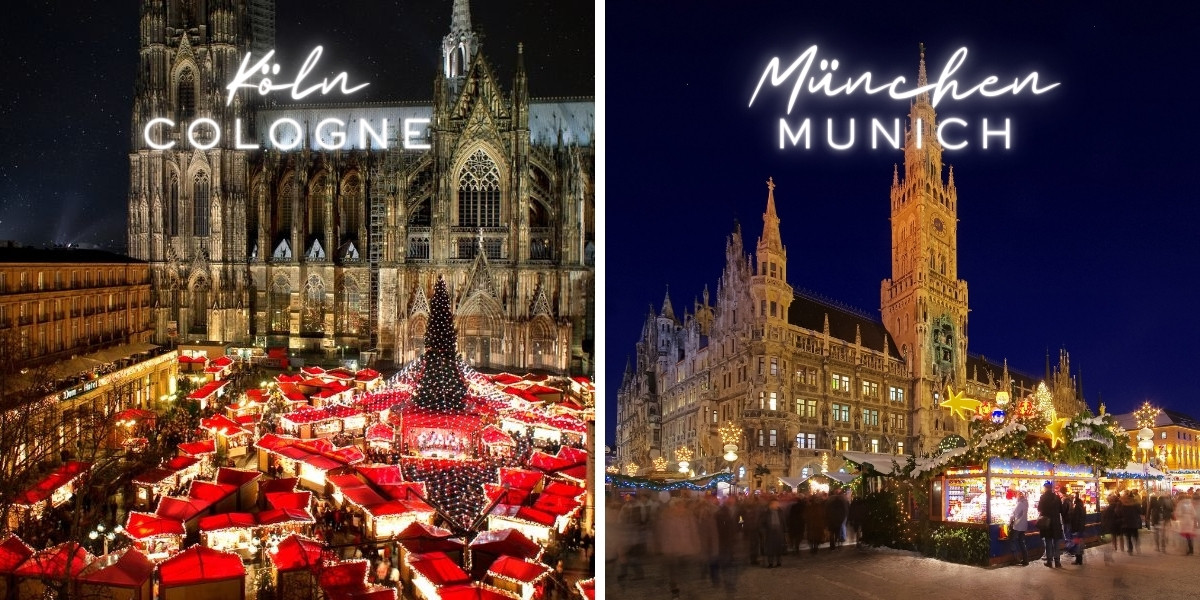 Legendary architecture in festive spirit.
Legendary architecture in festive spirit.German Food
And speaking of food, German cuisine may come with a few stereotypes of its own. However, it’s hearty, rustic, and perfect for fueling up before a day of trying to not look like a tourist.
The obvious meals you may have had elsewhere but definitely need to try in their home country are bratwurst (sausage), schnitzel (breaded and fried meat), and spätzle (egg noodles).
Stating the obvious here, no trip to Germany would be complete without sampling some of the country's famous beer, often brewed to strict purity laws.
If liquid hops aren’t your usual leaning, wines from the Mosel and Rhine regions are equally regarded in quality. Good to know if you’re visiting Cochem.
Like visiting any country, the best way to experience the culture is through its food and drink.
And while the aforementioned foods are the more standard traditional dishes, Germany is also known for its delicious baked goods.
So much so that German bread was added to the UNESCO list of Intangible Cultural Heritage. With more than 3,000 different types of bread on offer, the average German household consumes over 120 pounds of bread a year!
Also worth a try are the pretzels, strudel, and black forest cake.
 Carbs, carbs, and more glorious carbs.
Carbs, carbs, and more glorious carbs.While you may find most restaurants to be heavy on the meat selection, vegetarian and vegan dishes are quickly finding their way onto menus as well.
Of the top 15 most popular cities for vegans in 2020, four of them are in Germany: Hamburg, Berlin, Leipzig, and Cologne, with Berlin being known as the vegan capital of Europe and was even voted the vegan capital of the world in 2017.
For the best regional foods in Germany, Oma Gerhild has covered each state's famous dishes and some of her favorite recipes (find it here).
German Language Basics
There is universal appreciation for a guest in a country who makes even a small effort to learn the local language.
Nobody is expecting to have a full conversation with someone who isn’t local, but a few basic German phrases will go a long way in your experience and their impression of your own culture.
A benefit if you don't speak German is that, generally, you pronounce a word as you see it.
Other than a word with two vowels in it, the emphasis will be on the last vowel. Such as in Kiel (pronounced "Keel) and Leipzig (Lyp-zig).
Your efforts will be appreciated, no matter how awkward it might be for both parties. Even if it’s just a few small words or phrases like the following:
Hello (Hallo)
Please (Bitte)
Thank you (Danke)
Handy Info
Roughly 32% of people in Germany speak English. Although it's more prevalent in larger cities.
Outside of that, until technology advances to the point where instant translation is possible, I recommend an app like DeepL Translate.
You can type in a word or phrase and even hear back what it will sound like in German. Or take photos of signs, menus, etc., which will save you from having to constantly ask what this or that is.
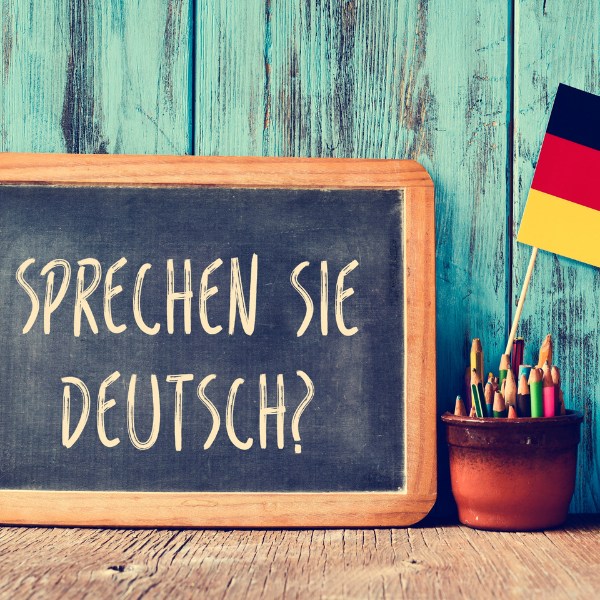 For the non-German speakers - Do you speak German?
For the non-German speakers - Do you speak German?Holiday Admin
I’ve purposely tucked this one away in the middle. Nobody wants to start a holiday with admin. But if you’ve made it this far, then you’re probably ready to do whatever it takes to make it happen.
So, practically speaking, there are a few matters to take care of when you’re in the planning stages.
Visa and Passport: First, make sure you have a passport that will be valid for at least six months after your planned return date.
If you’re a citizen of the European Union, you won’t need a visa to enter Germany, but if you’re from a non-EU country, you may need to apply for a tourist visa before you travel.
Insurance: It’s also a good idea to purchase travel insurance before your trip, which can provide coverage for medical emergencies, trip cancellations, and other unexpected events.
If you’re going with a tour operator, they might require you to provide proof of travel insurance before your booking.
Travel SIM: And if you plan on using your mobile phone in Germany, or even if you don’t plan to but emergencies demand otherwise, check with your carrier about international roaming plans or consider buying a local SIM card once you arrive.
Prices vary according to the amount of data included, but one could spend as little as $5 for emergencies.
If you’re going to go without, be sure to leave airplane mode switched on. One little slip on your favorite contact, and you could end up paying more in roaming charges than a travel SIM would’ve cost in the first place.
That said, many, if not most, cafes and restaurants will have wifi available.
 It'll all be worth it in the end.
It'll all be worth it in the end.German Money
When it comes to money, Germany uses the euro as its currency. Credit cards are widely accepted in cities and tourist areas, but even then, cash is king. And nowhere more than smaller towns and villages.
ATMs are readily available throughout the country, and most will accept foreign debit cards, but be prepared for some additional fees if you do.
Oma Gerhild and I use Wise for international travel. Not only for competitive exchange rates, but just the convenience of an international bank card without all the extra fees.
One concept gaining popularity in Europe is paying for the privilege to pee in public washrooms and service stations. When I say it's handy to have a few euros in your pocket should nature come calling, it's more of a requirement than a novelty.
Since you're traveling, whether to tip or not will undoubtedly come up.
Known as Trinkgeld (literally, drink money), the original concept was so the service provider could buy themselves something to drink. Toasting the health of the generous tipper in the process.
In a nutshell, it isn't mandatory. But it's always welcome on the heels of appreciating good service.
It's common to round up to the nearest euro in bars and cafes. While restaurants would look at 5–10% as reasonable and 15% considered generous. Unlike in other countries, in Germany it's common to pay the tip to the server directly instead of leaving it on the table.
Tipping for taxis is similarly not expected. But I would still recommend a gratuity if the driver helps with your bags or makes any extra concessions that made your journey more enjoyable.
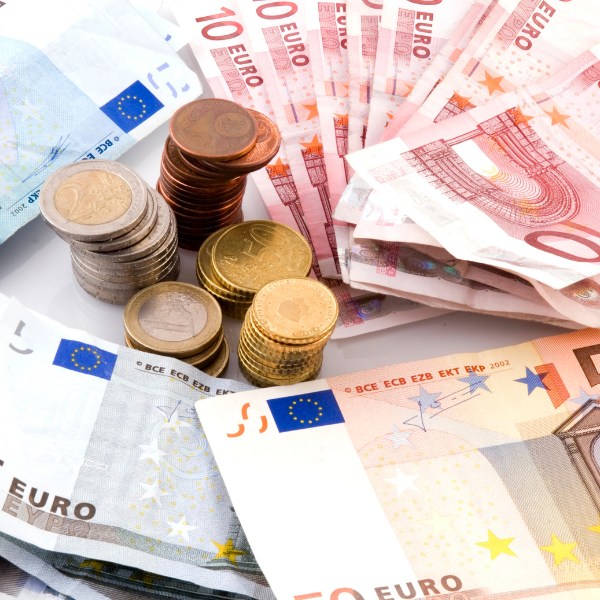
German Law
One thing to keep in mind when traveling in Germany is that there are a few unique laws that may be different from what you’re used to. For example, jaywalking is illegal in Germany, but drinking in public is allowed.
Generally speaking, do the same as you would in your own country.
 Statue of the Lady of Justice in Frankfurt.
Statue of the Lady of Justice in Frankfurt.On the whole, many of Germany’s cities are known for their safety when compared to their global equivalents.
Cities like Munich, Stuttgart, and Dresden all have some of the lowest crime rates in Germany.
That’s not to say dangling a 4K camera around one’s neck with a wallet sticking out of the back pocket will ever be a good idea. Tourist hotspots will always be a target for pickpockets.
Like anywhere, keep your valuables close and be mindful of your surroundings, especially in train stations or busy public spaces.
Germany Nature
Done with the nitty-gritty, and on to one of the best things about traveling in Germany: the country’s stunning natural beauty (which I've previously written about here).
From the rugged coastline of the North Sea to the rolling hills and mountains of the Bavarian countryside, Germany offers a diverse range of spectacular scenery and outdoor activities.
Popular options include hiking the Black Forest, cycling along the Rhine River (or a river cruise for a more relaxed approach), or skiing in the Bavarian Alps.
If you’re planning on doing any outdoor activities or exploring Germany’s rugged natural areas, be prepared. Like anywhere, really. It should go without saying, but it equally bears repeating.
Be sure to bring or buy appropriate gear, maps, and supplies. And just like elsewhere in the northern hemisphere, the summer months also bring the risk of ticks. Be mindful and take precautions where possible.
Also, make sure your travel insurance covers whatever activity you’re planning. Not all plans will offer standard coverage for your particular choice of adrenaline rush.
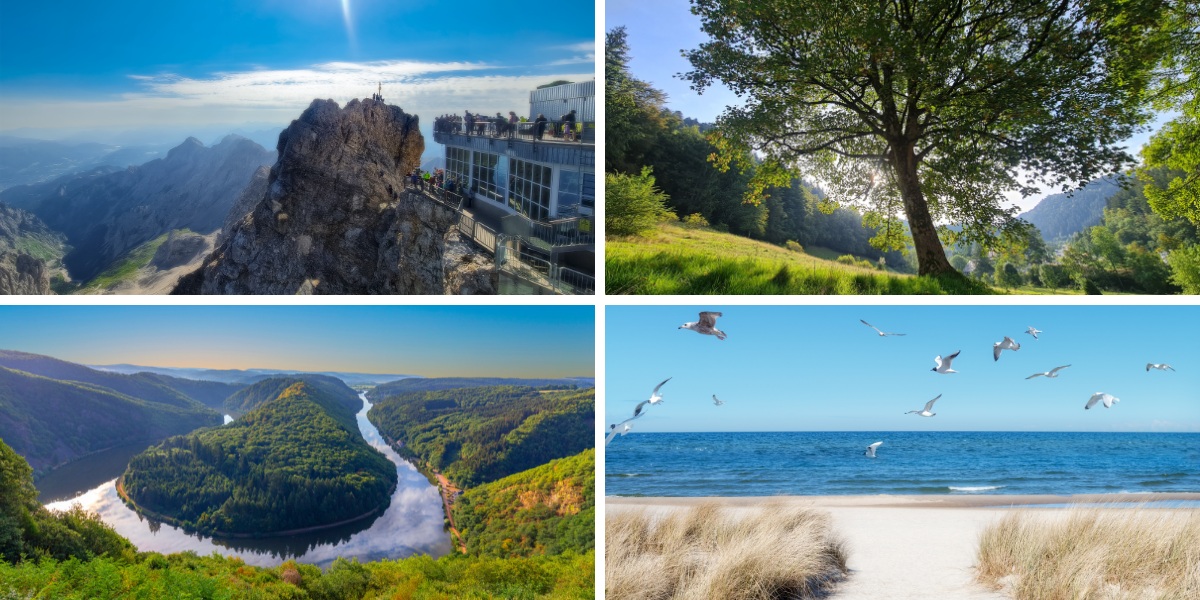 The beautiful Bavaria, Black Forest, Saarland, and Rugen Island.
The beautiful Bavaria, Black Forest, Saarland, and Rugen Island.German Art and History
If you’re interested in history, Germany is a treasure trove of fascinating landmarks, castles, and museums. Cities like Munich, Nuremberg, and Berlin in particular have many significant World War II-related sites and museums that are well worth a visit.
Random Fact
Berlin has more museums than rainy days in a year.
For art and culture lovers, there is no shortage of galleries and opera houses.
The Pergamon Museum, on Museum Island in Berlin, houses an impressive collection of ancient artifacts, while the Alte Pinakothek in Munich showcases masterpieces by European painters such as Rubens and Rembrandt.
And in Cologne, the Museum Ludwig features an extensive collection of modern and contemporary art.
Where a cultured night out is required, the National Theatre in Munich is home to the world-renowned Bavarian State Opera on one of the world’s largest opera stages.
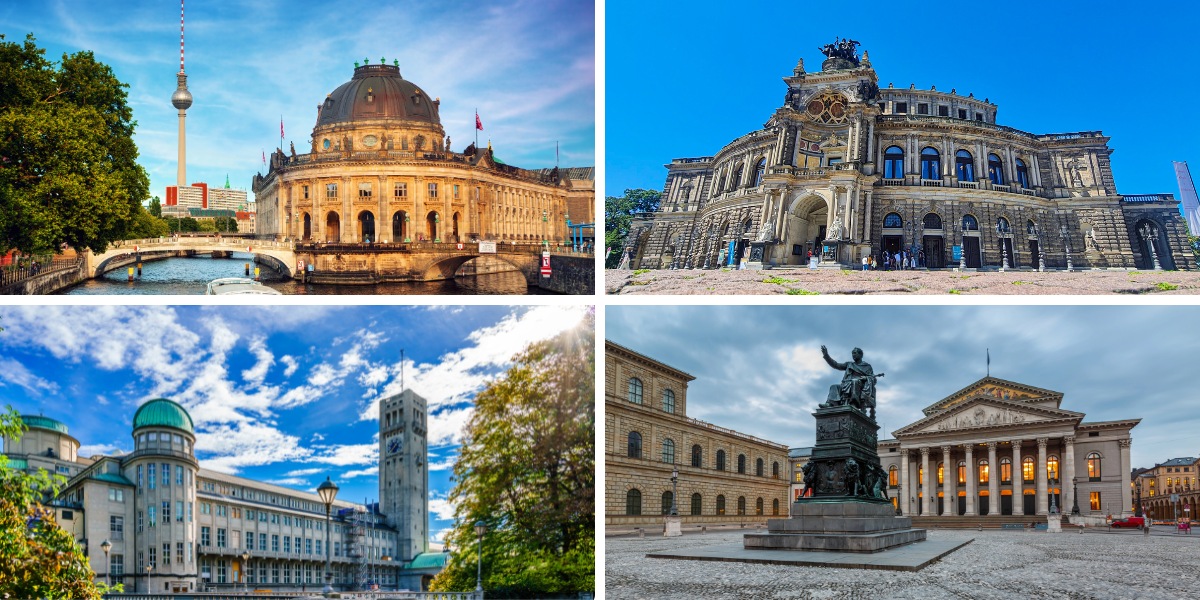 Museum Island in Berlin, the Semperoper in Dresden, and Deutsches Museum and the National Theater in Munich.
Museum Island in Berlin, the Semperoper in Dresden, and Deutsches Museum and the National Theater in Munich.German Festivals
Festival culture in Germany is known the world over with the likes of Oktoberfest.
However, millions more attend the many Christmas markets, the colorful pageantry of Cologne’s Carnival, and Berlin’s prestigious International Film Festival. All of which go on for days or weeks at a time.
During the warm summer season in any of Munich’s many beer gardens, it can feel like a festival in itself.
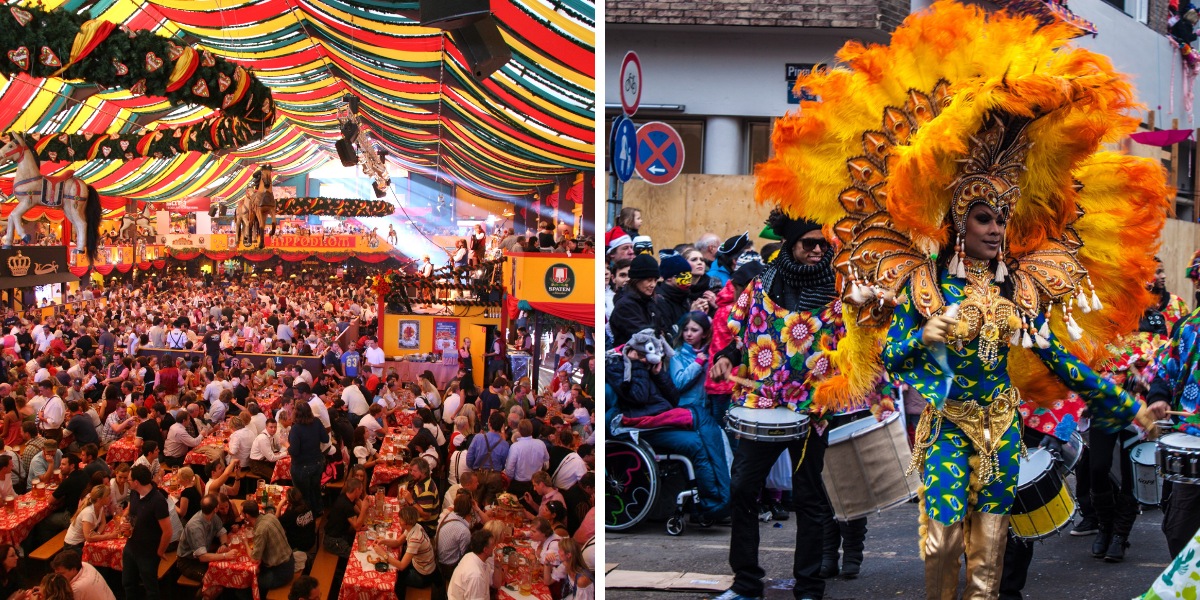 The very colorful Oktoberfest and Cologne's Carnival festivals.
The very colorful Oktoberfest and Cologne's Carnival festivals.Where to go Shopping in Germany
In any of Germany’s larger cities, you’ll find the shopping experience comparable to that of New York, Paris, and London.
However, as a tourist, you’ll undoubtedly be looking for a memento for yourself or to bring back as a gift. Filling that particular void is the usual tourist trap shop found in every city, large or small.
But it’s the outdoor markets or specialty shops, especially in the small towns, that offer something truly unique.
One of our recent tours took us through the Black Forest, where we stayed at Hotel Hofgut Sternen in Breitnau. Among the shops in this little complex were artisan glass blowers and a vast array of cuckoo clocks.
A larger suitcase was definitely needed. But the point is, it’s places like this to keep an eye out for, as you’ll be going back home with a true conversational piece.
For those ‘city name products’ that proliferate in the tourist shops, we’re hard at work updating our online shop with those memento items, just in case you missed bringing back a shirt or mug.
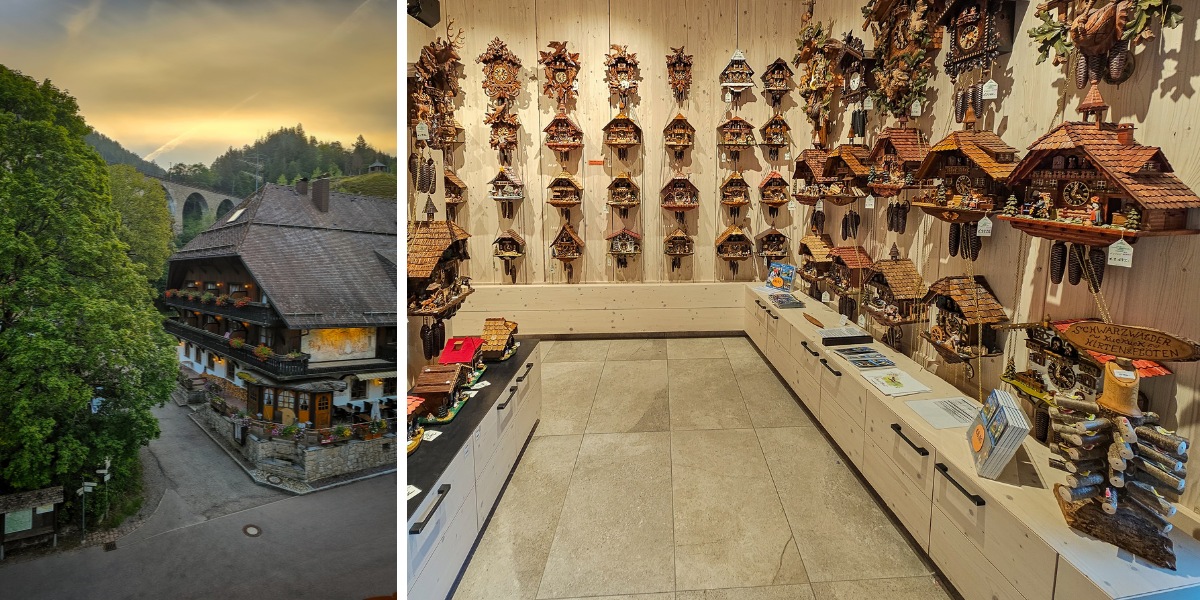 Not your usual shopping experience.
Not your usual shopping experience.German Environmental Standards
For all the times we’ve visited Germany, I’ve always been amazed at how clean the cities and towns are. Oddly coinciding with that observation was also how few garbage bins were around.
While I’ve not done an in-depth environmental research analysis on the matter, this does encourage me to think that general tidiness is more of a national mindset than just leaving it for someone else to deal with.
On the one hand, the lack of litter may well come from a point of pride in one's surroundings. On the other hand, a commitment to the environment is very much a top-down approach as well.
Construction projects with a green-centered approach, like the Reichstag in Berlin, are becoming more commonplace. Come for the dome, stay for the view.
Joined at the hip to environmental awareness is also Germany’s affinity for cycling and e-scooter rentals (especially in big cities).
Berlin, in particular, has multiple e-scooter providers (find them here). To that end, you’ll find them more and more throughout the country if you want to challenge your balancing abilities.
Just like in other countries, riding an e-scooter on the sidewalk is not permitted and will incur a fine along with public embarrassment.
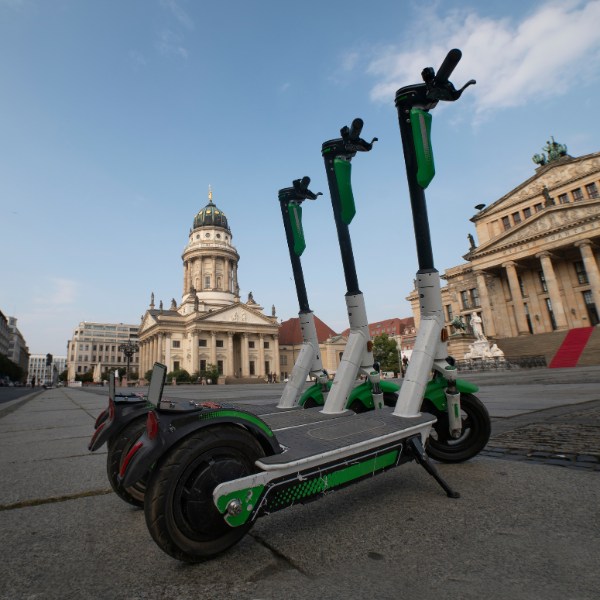 Scooting with a view.
Scooting with a view.Top Destinations in Germany
Now for the good stuff. Let’s dive into some of the top destinations to visit in Germany. If you’ve looked around our site already, you’ll have seen that Germany is home to many beautiful cities.
Each city, town, and village has its own unique charm and character. Some of the most popular cities to visit include Berlin, Munich, Hamburg, and Frankfurt.
Berlin, the capital city, is known for its vibrant arts scene, fascinating history, and trendy neighborhoods.
Munich, located in the southern state of Bavaria, is famous for its stunning architecture, world-class museums, and, of course, Oktoberfest.
Hamburg, a port city in the north, offers a mix of modern and historic attractions.
Frankfurt, a major transportation hub and financial district, is centered on its historic Altstadt.
Beyond the big cities, Germany also has many charming, smaller towns and villages that are definitely worth exploring.
Some of the best places to visit include Rothenburg ob der Tauber, Germany’s best-preserved medieval town located along the Romantic Road.
Heidelberg, home to its stunning namesake castle and historic university.
Cochem is a beautiful town on the banks of the Moselle River and surrounded by vineyards.
Among the most iconic landmarks in Germany is the Cologne Cathedral, a beautiful Gothic church that took over 600 years to build. Located in the heart of Cologne and right by the train station, this UNESCO World Heritage Site is a must for any and every visitor to the city.
Millions of people will have seen an adaptation of Germany’s most famous castle at some point in their lives. Found in the Bavarian Alps, Neuschwanstein Castle is the inspiration for the fairytale abode of Sleeping Beauty and the Disney logo.
I highly recommend taking the horse-drawn carriage up from the village of Schwangau below. Besides it being a fair ol’ walk uphill, where else can you ride in a carriage up to a castle?
And of course, Berlin. Along with the infamous Checkpoint Charlie and remnants of the Berlin Wall, the capital city boasts other architectural giants like the Berlin Cathedral and the Brandenburg Gate.
Conclusion
If you’ve made it this far through the German Travel Tips Guide, many congrats!
That was a bit of a mouthful, but it only goes to show how wonderful and diverse Germany as a country is.
Whether you’re interested in history, culture, outdoor adventures, or simply basking in some quintessential Germanic atmosphere, there’s plenty to appeal to a range of travel tastes and budgets.




